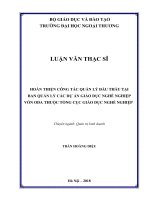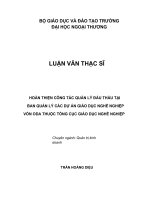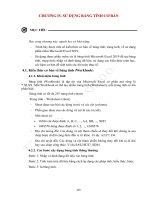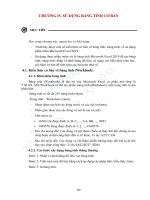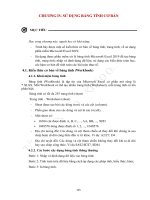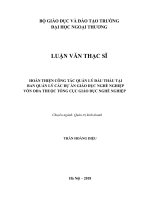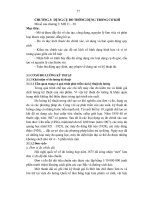Tài liệu dạy học môn Tiếng Anh (Trình độ: Trung cấp): Phần 2 - Tổng cục Giáo dục nghề nghiệp
Bạn đang xem bản rút gọn của tài liệu. Xem và tải ngay bản đầy đủ của tài liệu tại đây (2.15 MB, 71 trang )
UNIT 6: VACATION
WARM-UP
A. Talk about the pictures with a partner.
What can you see?
Where are these places?
B. What do you like to do on vacation?
sunbathe on the beach
go to a theme park
travel to a lot of new places
spend your time on a farm
VOCABULARY 1: VACATION ACTIVITIES
A. Match each activity with a picture. (a)________
1. _____ go sightseeing
2. _____ go camping
3. _____ sunbathe on the
beach
4. _____ visit pagodas
5. _____ go on a guided tour
6. _____ stay on a farm
(c) ________
7. _____ go to a theme park
8. _____ go hiking
9. _____ visit grandparents
10. ____ go to the cinema
(e) ________
(f) ________
60
(b) ________
(d) ________
(g) ________
(h) ________
(i) ________
(j) ________
B. Check () the vacation activities you enjoy. Ask and answer questions with a
partner.
Do you like to go
sightseeing when you
go on vacation?
Yes, of course. I think
going sightseeing is
interesting!
GRAMMAR FOCUS 1: PAST SIMPLE OF BE AND CAN
Past Simple: Be
Affirmative
Grammar point
I/he/she/it was in Paris.
We/you/they were in Paris.
Negative
I/he/she/it wasn’t in Paris.
We/you/they weren’t in Paris.
Interrogative
Was I/he/she/it in Paris?
Yes, he/she/it was. / No, he/she/it wasn’t.
Were you/we/they in Paris?
Yes, we/they were. / No, we/they weren’t.
Note: wasn’t = was not; weren’t = were not
Grammar point
Past Simple: Can
Could is used for all persons.
Affirmative
He could swim when he was child.
Negative
He couldn’t swim when he was a child.
Interrogative
Could he swim when he was a child?
Yes, he could. / No, he couldn’t.
Note: couldn’t = could not
61
A. Complete the conversation with was, were, wasn’t or weren’t.
Rose: Where (1) _____ you last night, Anne?
Anne: Well, I (2) _____ at home with my mum.
Rose: You (3) _____ at the cinema with John?
Anne: No, I couldn’t go because my mum (4) _____ sick.
Rose: What a pity.
Anne: How (5) _____ the film?
Rose: It (6)_____ pretty good, but the ending (7)_____ very happy.
B. Write sentences using could and was
1. He / read / five
He could read when he was five.
2. John / play piano / six
______________________________________.
3. My brother / draw beautiful pictures / seven
______________________________________.
4. We / speak two foreign languages / eighteen.
______________________________________.
5. She / dance / eight
______________________________________.
6. Tiger Woods / play golf / three
______________________________________.
C. Write questions using the Past simple form of be and can.
1. walk / one
Could you walk when you were one?
2. write your name / three
________________________________
3. read / two
________________________________
4. count from one to ten / two
________________________________
5. talk / three
________________________________
6. ride a bike / six
________________________________
7. swim / five
________________________________
62
D. Work in pairs. Ask and answer questions in Exercise D.
Could you walk when
you were one?
Yes, I could. /
No, I couldn’t.
LISTENING
A. People are talking about their vacations. Did they enjoy them? Listen and
choose Yes or No.
1. Yes
2. Yes
3. Yes
4. Yes
No
No
No
No
5. Yes
6. Yes
7. Yes
8. Yes
No
No
No
No
B. Listen again and match.
1. The weather was __________.
2. The people were ____________.
3. The ski trip was _______________.
4. Their trip to France was __________.
5. Her trip to the beach was __________.
6. The hotel wasn’t ___________________.
7. Shopping in Thailand was __________.
8. His vacation was too ___________________.
a. fantastic
b. terrible
c. disappointing
d. nice
e. clean.
f. awful
g. short
h. terrific
C. People are talking about their vacations. Listen and check the correct answer.
1. She learned to surf very fast.
True
False
2. It was cool at night.
True
False
3. The museums were boring.
True
False
4. The weather was fantastic.
True
False
5. He traveled to the USA.
True
False
6. They had a comfortable trip.
True
False
63
SPEAKING
A. Read the information about Jim and Army. Make notes about your last
vacation.
Questions
Jim
Army
Me
Where/go?
Vermont
Japan
When/go?
last June
last October
How long/stay? a week
three weeks
How/travel?
train
plane
Where/stay?
a bed and breakfast
went walking in the
countryside
some beautiful
mountains and rivers;
not any people!
with friends
visited Tokyo and
Kyoto
some beautiful
temples; not Mount
Fuji
What/do?
What/see?
Enjoy the
yes
Yes
vacation?
B. Work with a partner. Ask and answer questions with When did you last...?
Ask another questions for more information.
When did you last take a vacation?
Last August.
Where did you go?
To Florida
Yukio took a vacation last August and she went to Italy.
take a vacation
take a photo
watch a DVD
go to a party
go shopping
talk on a cell phone
Tell the class some things you learned about your partner.
64
write an e-mail
get a present
eat in a restaurant
READING
My First Trip to Hanoi
My name’s Nam and I want to tell you a funny story about my first trip. Last
weekend I went to Hanoi with my family. We took a cheap flight and we stayed in a
hotel in the city centre. I packed all my clothes and my computer in a bag. My dad
asked me not to check it in but I did. We got our luggage at the airport. When I
opened my bag, it was full of books and girls’ clothes. The bag looked exactly like
my bag but there were skirts, shoes and lots of books and magazines. I phoned the
airport but they didn’t know anything about my bag. Therefore, I spent three days
without any clothes and computer. My brother gave me some of his clothes but they
were too big and I looked terrible! We also visited some famous places in Hanoi such
as Hoan Kiem Lake, Tran Quoc Pagoda and I took some photos of my family. On the
last day of my trip, my bag suddenly arrived at the hotel. I was very happy to see it
and I didn’t have to pack. Anyway, we had a great trip.
Hoan Kiem Lake
A. Read the text again and decide if the sentences are T (TRUE) or F (FALSE).
1. Nam went to Hanoi with his friends.
2. They stayed in a hotel in the city centre.
3. Nam packed only his clothes in a bag.
4. They stayed in Hanoi for a week.
5. Nam had a bad trip.
B. Read the text and answer the following questions.
1. What did Nam take with him to Hanoi?
2. Did he have his computer in Hanoi?
3. How long did he stay in Hanoi?
4. Why did Nam ‘look terrible’ in Hanoi?
65
GRAMMAR FOCUS 2: PAST SIMPLE – REGULAR VERBS & IRREGULAR
VERBS
PAST SIMPLE – REGULAR VERBS & IRREGULAR VERBS
Past Simple tense is used to talk about a completed action in the
past.
The form of Past Simple is the same for all persons.
1. Most verbs: add –ed watch watched
2. Verbs ending in -e: add –d dance danced
3. Verbs ending in a consonant and -y: change –y to -ied
study studied
4. Verbs ending in a short vowel and a consonant: double the
consonant and add –ed chat chatted
plan planned
5. However, there are a lot of irregular past tense forms in English.
Here are some common irregular verbs in English, with their past
tense forms:
Base form Past form
break
broken
buy
bought
catch
caught
do
did
grow
grew
hide
hid
keep
kept
know
knew
make
made
pay
paid
read
read
say
said
see
saw
sell
sold
send
sent
sleep
slept
speak
spoke
spend
spent
tell
told
wear
wore
66
A. Put the time expressions below in the correct order (1-9). Start with the most
recent.
four years ago
last year
yesterday morning
yesterday afternoon
last week
last night
last month
the day before yesterday
two months ago
1. _____________________
2. _____________________
3. _____________________
4. _____________________
5. _____________________
6. _____________________
7. _____________________
8. _____________________
9. _____________________
B. Write sentences using Past simple tense.
1. they/ play/ football/ yesterday
They played football yesterday.
2. last year/ I/ celebrate/ birthday party/ in a restaurant.
___________________________________________
3. My mother/ clean/ house/ at the weekend
___________________________________________
4. Tom/ send a message/ his girlfriend/ yesterday morning
___________________________________________
5. We/ travel/ Dalat City/ three years ago.
___________________________________________
6. My sister/ wash/ her clothes/ last night.
___________________________________________
7. Last week/ Peter and John/ return/ their hometown
___________________________________________
C. Ask each student to use each verb below to create a sentence describing his or
her activity in the past.
chat cook study walk phone
visit work watchplay listen stay
talk
I played chess with my
father last night.
I visited my
grandparents two
months ago.
67
VOCABULARY 2: VACATION ITEMS
A. Match each item with a picture.
1. ______ map
2. ______ passport
(a)
3. ______ sunglasses
4. ______ camera
5. ______ umbrella
6. ______ tent
7. ______ first aid kit
8. ______ sandals
(c)
(f)
(d)
(b)
(e)
(g)
(h)
B. Match each item above (1-8) with a definition.
1. ______ You can take a lot of pictures with this.
2. ______ We wear these on your feet in hot weather.
3. ______ These protect your eyes when it is very sunny.
4. ______ You sleep in this when you go camping.
5. ______ You use this in case of the rain.
6. ______ You use this when you get injured.
7. ______ This helps you when you are lost.
8. ______ You show this when you enter or leave a foreign country.
68
WRITING
Write a short paragraph about your last vacation in the past using Past simple
tense. Include the following information in your writing.
1. Note where you had your vacation.
2. Note whom you went with and whom you met.
3. Note the place where you stayed.
4. Mention some special places you went to and
food you ate during your vacation.
5. Mention some activities you enjoyed and didn’t
enjoy during your vacation.
6. Provide your feeling about the vacation.
69
REVIEW & EXPANSION
UNITS 5 & 6
A. Put the words in the correct order to make sentences in Present continuous.
1. homework/ doing/ the/ I’m/ now
I’m doing the homework now.
2. watching/ my brothers/ TV/ are
___________________________________.
3. our dog/ eating/ is/ food/ its
___________________________________.
4. the/ shining/ is/ sun
___________________________________.
5. a/ Maria/ coat/ wearing/ is
___________________________________.
6. you’re/ the guitar/ playing
___________________________________.
7. my/ me/ sitting/ best friend/ next to
___________________________________.
8. breakfast/ cooking/ my mother/ is
___________________________________.
B. Make the sentences in exercise A negative.
1. ____________________________________.
2. ____________________________________.
3. ____________________________________.
4. ____________________________________.
5. ____________________________________.
6. ____________________________________.
7. ____________________________________.
8. ____________________________________.
C. Complete the questions using the Present continuous form of the verbs in
brackets. Then write true answers.
1. ________ it ________ (rain) outside?
________________
70
2. ________ the sun ________ (shine)?
________________
3. ________ your friends ________ (sit) near you?
________________
4. ________ you ________ (wear) jeans?
________________
5. ________ you ________ (listen) to music at the moment?
________________
6. ________ you ________ (eat) anything at the moment?
________________
D. Complete the email. Use the Present continuous form (affirmative, negative
or interrogative) of the verbs in brackets.
To:
Dear Peter,
How are you? 1___________(enjoy) your new school?
Everyone here is fine, but 2___________ (get) really
angry with my brother. He 3___________ (do) lots of
exams this term, so he 4___________ (work) very hard.
He spends every evening at his desk. I have to do all his
jobs around the house because he 5___________ (help)
with the housework at all. It’s so unfair!
That’s all for now. Mum 6___________ (call) me.
Dinner is ready! When 7___________ (plan) to visit us?
Love,
John
71
E. Complete the email. Use the Present simple or Present continuous forms of
the verbs in brackets.
To:
Hi Susan,
What 1___________ (you/ do) at the moment?
I 2___________ (sit) in Mario’s café. I 3___________
(drink) a milkshake. This café 4___________ (make)
the best milkshake in town! I 5___________ (often/
come) here after school with my friend Mary. In fact, I
6___________ (wait) for her now. She’s always late. I
7___________ (not understand) why! Anyway, can I
borrow your geography textbook? I 8___________
(need) it for that test next week. I can’t find mine. Oh,
Mary 9___________ (come) into the café now.
Bye, seethe
yousentences
later,
F. Complete
with the correct form of the verbs in brackets. Use the
Present
simple in one gap and the Present continuous in the other.
Dan
1. Tom often ___________ sandals to school, but today he ___________ shoes.
(wear)
2. We ___________ a DVD at the moment, but we ___________ TV in evenings.
(watch)
3. I usually ___________ a sandwich for lunch, but today I ___________ some soup.
(have)
4. Jason and Tilly ___________ their rooms right now, but they usually
___________ them at the weekend. (clean)
5. He usually ___________ news on the newspaper, but he ___________ news on the
computer now. (read)
72
G. Complete the sentences with the verbs below. Use the affirmative or negative
form of the Present simple or the Present continuous.
have
know
laugh
like
prefer
sing
watch
1. Which _______ you _______, blue or green?
2. “Where’s Tom?” “He___________ a shower”.
3. I ___________ this pizza. It’s horrible!
4. “We ___________ the answer to this question”.
“Well, ask the teacher”.
5. “What’s that terrible noise?” “Kate ___________!”
6. “Why _______ Ben _______?”
“Because he ___________ a funny film”.
H. There are mistakes in five of these sentences. Find the mistakes and write the
five sentences correctly.
1. “Are you wanting an ice-cream?” “No, thanks”.
_____________________________________________.
2. Right now I do my homework.
_____________________________________________.
3. Tom and Peter are hating maths.
_____________________________________________.
4. I doesn’t believe in ghosts.
_____________________________________________.
6. I’m sometimes play the guitar in my bedroom.
_____________________________________________.
I. Complete the Past simple sentences. Use the words in brackets
1. I usually walk to school. (cycle)
Yesterday, I cycled to school.
2. I usually watch TV before school. (listen to music)
This morning, ________________________________.
3. Most weekends, I play football. (play basketball)
Last weekend, ________________________________.
4. We’re visiting the USA. (live there)
Ten years ago, ________________________________.
5. She’s often late for school. (arrive early)
Yesterday morning, ________________________________.
73
6. This morning, the weather is fantastic. (rain every day)
Last month, ________________________________.
7. I usually go on holiday with friends. (travel alone)
Last summer, ________________________________.
J. Complete the sentences with you own ideas using the Past simple.
1. Last weekend, _______________________________.
2. Two years ago, _______________________________.
3. Yesterday, _______________________________.
4. Last summer, _______________________________.
5. Yesterday morning, _______________________________.
6. Last month, _______________________________.
K. Underline one mistake in each sentence. Write the sentences correctly.
1. I started school ago six years.
_____________________________.
2. We trainned for six months for this competition.
_____________________________.
3. I chat to my cousins in Italy last night.
_____________________________.
4. We planed our holiday this morning.
_____________________________.
5. I watched a great DVD afternoon yesterday.
_____________________________.
6. My parents both studyed maths.
_____________________________.
7. My uncle moved to Canada last summer ago.
_____________________________.
8. The bus stoped in front of the town hall.
_____________________________.
74
L. In some of these sentences, the past simple form is incorrect. Underline the
incorrect verbs and write the sentence correctly. Tick the correct sentences.
1. I taked a lot of photos yesterday.
_____________________________.
2. I did my homework this morning.
_____________________________.
3. We speaked to the teacher earlier.
_____________________________.
4. I had cereal for breakfast.
_____________________________.
5. You comed home late last night.
_____________________________.
6. My grandfather fighted in World War 2.
_____________________________.
M. Complete the sentences with the Past simple affirmative form of the verbs
below. All the verbs are irregular.
buy catch draw dream
fall
find
see
think
1. When I was at the beach, I ________ a picture of face in the sand.
2. She’s in hospital because she ________ off her horse.
3. He ________ presents for all of his family.
4. She ________ about her answer for a long time before speaking.
5. My friend ________ a gold ring at the bottom of a swimming pool.
6. They ________ the last bus home at midnight.
7. She ________ about becoming a film star.
8. The teacher ________ me using my smartphone in class.
N. Write sentences in the Past simple affirmative. Some verbs are regular and
some are irregular.
1. we/ see/ an interesting film/ last night
______________________________________.
2. I/ travel/ around Japan/ last summer
______________________________________.
3. my brother/ bring/ home/ a cat/ yesterday
______________________________________.
75
4. I/ get/ a good grade/ last term
______________________________________.
5. my cousins/ arrive/ a few minutes ago
______________________________________.
6. the lesson/ finish/ an hour ago
______________________________________.
7. I/ cook/ dinner/ yesterday evening
______________________________________.
8. my parents/ teach/ abroad/ ten years ago
______________________________________.
76
UNIT 7: ACTIVITIES
WARM-UP
A. Talk about the pictures with a partner.
What can you see?
Where are the people?
(a)
(b)
(c)
(d)
B. Match each activity below with a picture.
_______drink coffee in the café
_______ learn in the room
_______ work in the office
_______ ride a motorbike on the road
77
VOCABULARY 1: DAILY ACTIVITIES
A. Match each activity with a picture.
1. _____ wash the dishes
(a)
2. _____ watch a movie
3. _____ play basketball
4. _____ play a computer game
5. _____ make a cake
6. _____ study English
7. _____ make the bed
8. _____ do homework
9. _____ iron the clothes
10. ____ go shopping
(b)
(c)
(e)
(f)
(h)
(d)
(g)
(i)
(j)
78
B. Ask and answer questions with a partner.
What is she doing?
She is washing the
dishes.
Grammar point
GRAMMAR FOCUS 1: PRESENT SIMPLE AND PRESENT CONTINUOUS
Present Simple
Present Simple is used to describe habits, truths and fixed
arrangement.
Affirmative
He always gets up early.
Negative
He doesn’t like coffee.
Interrogative
Does the train leave at 7 a.m.?
Present Continuous
Present Continuous is used to describe actions happening at the
moment of speaking.
Affirmative
She is making a phone call.
Negative
He isn’t talking on the phone now.
Interrogative
Is your brother learning in the room?
A. Complete the conversation with the Present simple or Present continuous
form of the verbs in brackets.
Rose: Hi Anne. (1)_____ (you/enjoy) the song?
Anne: Not very much. I (2)_____ (like) pop songs. This one is not my style.
Rose: It’s my mother’s favourite song.
Anne: Oh, really? The band (3)_____ (not play) badly now. Lots of people
(4)
_____ (dance) and (5)_____ (sing). Who is your mother’s favourite
singer?
Rose: This one. She (6)_____ (wear) a red hat.
Anne: Great! But I (7)_____ (not know) her name.
Rose: She’s Christina. She (8)_____ (perform) very well.
79
LISTENING
A. Steven is talking about his activities. Listen and check () the activities he
does or does not do.
Steven’s activities
does
does not
do
1. Playing video games
2. Going camping
3. Hiking
4. Shopping
5. Surfing the Internet
B. Listen again and answer the following questions
1. What do the speaker and his friends want to do in their free time?
2. Why doesn’t the speaker love going shopping?
3. What is his favourite indoor activity?
SPEAKING
Complete the questionnaire. Then interview a friend.
Questions
Your answer
1. What time do you usually get up?
2. Do you always have breakfast?
3. What time do you go to school?
4. Are you often late for class?
5. What time do you have dinner?
6. What time do you often do your
homework?
7. Do you study at night?
80
Your friend’s
answer
READING
Dear Jenny,
Hi! I’m enjoying my vacation in
Dalat city. I’m staying with my
aunt’s family. They’re very
hospitable. I’m writing this
letter in the living room and
my aunt’s children are sitting
here with me. They’re watching
cartoons on TV.
As you know, I’m going sightseeing here. I really love this
city because I’m learning a lot
about Vietnamese culture. I
visit a lot of places and the
are
very
I
Read thelandscapes
letter and check () your
answers
aboutbeautiful.
Susan.
Yes No Don’t know
can
speak
a
little
Vietnamese,
1. Susan is enjoying her vacation in Dalat city.
2. She’s staying in a hotel.
but
I
can’t
read
and
write
it.
3. Susan’s aunt has two sons.
4. She
is watching cartoons
TV now. is delicious
Anyway,
theonfood
5. She’s going swimming.
6. Vietnamese
cultureeating
is hard to understand.
and I’m
a lot! The
7. She can read and write in Vietnamese very well.
8. Vietnamese
food isis
good.
It’s
weather
also wonderful.
9. She likes the weather.
cold
here
in December.
10.quite
The photo of
Dalat city
is beautiful.
81
GRAMMAR FOCUS 2: VERB + INFINITIVE OR –ING FORM (GERUND)
In English:
1. Some verbs are followed by the infinitive of another verb.
Mary wants to learn Vietnamese.
2. Some verbs are followed by the –ing form (gerund) of another verb.
Mary enjoys learning Vietnamese.
Verb + infinitive
Verb + -ing form
agree, arrange, ask, decide,
avoid, consider, enjoy, fancy,
expect, hope, learn, offer, plan,
keep, mind, practice, postpone,
promise, refuse, want
finish, dislike
Verb + infinitive or –ing form (with little or no change in meaning)
begin, continue, hate, like, love, prefer, propose, start
A. Complete the sentences with the infinitive or –ing form of the following verbs.
pay
win
learn
help
talk
play
go
1. I’m very confident. I usually expect ______ any games.
2. John is very generous. He always offers ______.
3. Susan is a big fan of films. She enjoys ______ to the cinema every weekend.
4. She is so talkative. She keeps ______ even when no one listens.
5. He is very busy, so he refuses ______ me with the homework.
6. My brother really enjoys sports, so he likes ______ tennis almost every
morning.
7. I begin ______ English today.
B. Complete the sentences with the infinitive or –ing form with your true
information. Then tell your classmates.
1. I usually avoid…
2. I don’t mind…
3. I really want…
4. Now I decide…
5. I enjoy…
6. I sometimes keep…
I usually avoid walking in
the rain.
I don’t mind helping
him.
82
VOCABULARY 2: PERSONALITY ADJECTIVES
A. Match the personality adjectives in A with their opposites in B.
A
B
kind
polite
confident
optimistic
talkative
lazy
funny
friendly
patient
generous
quiet
shy
pessimistic
unkind
rude
mean
unfriendly
serious
hard-working
impatient
B. Fill in each gap with an appropriate adjective in Exercise A .
1. John is very ______. He keeps doing things until he is successful.
2. Mr Jackson usually gives some of his money to the poor. He is so ______.
3. When I was at high school, I was too ______ to speak before the class.
4. My sister always says “thank you” when someone helps her. She is ______.
5. Peter never finishes his homework before class. He is so ______.
6. Tom is very ______. He always thinks about bad results before doing
something.
WRITING
Imagine you are at breaktime at school. Write a short paragraph about current
activities of your classmates and yourself using Present simple and Present
continuous. Include the following information in your writing.
1. Note where you and your friends are .
2. Note the estimated number of people you can see at breaktime .
3. Mention what you and your friends are doing.
4. Mention how you and your friends feel.
83
UNIT 8: HOBBIES AND INTERESTS
WARM-UP
Talk about the pictures with a partner.
Who are these people? Where are they? What are they doing?
VOCABULARY 1: HOBBIES AND INTERESTS
A. Match each activity with a picture.
1. _____ read a book
(a)
2. _____ go to a concert
3. _____ plant flowers
4. _____ take photos
5. _____ watch a movie
6. _____ visit places
7. _____ learn a language
8. _____ collect stamps
(b)
(c)
(d)
(e)
(f)
(g)
(h)
84
